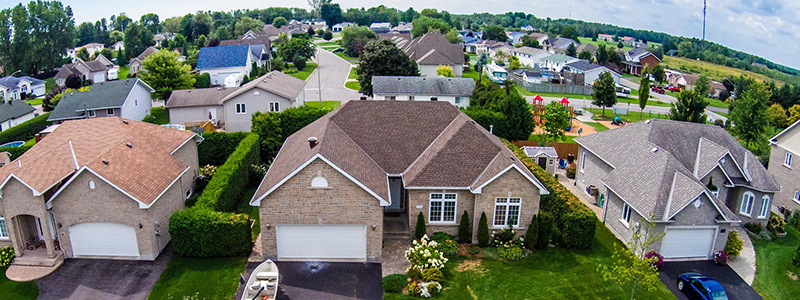
Short for “Zillow Estimate,” a Zestimate is Zillow’s proprietary home valuation tool that utilizes an algorithm and publicly available information about a property to provide an estimate of its current market value.
So, what is a Zestimate for and how can you tell if it’s accurate? Let’s take an in-depth look at this popular online home valuation tool and investigate its efficacy in different applications.

How Is a Zillow Estimate Calculated?
In order to calculate a Zestimate, Zillow feeds both publicly available data and user-supplied data about a property into its proprietary algorithm. This data is pulled from the local area Multiple Listing Service (MLS), as well as public records.
The data used includes the basic information available about the home, such as the number of bedrooms and baths, location, and square footage, along with current listing information, information from prior sales, tax records, comparable homes, current market trends, and even scans of the property photos.
It is important to remember that, while it may mimic many of the same methods of an appraisal, a Zestimate is an estimation only and cannot be used in place of an official appraisal.

What Factors Impact Zestimate Accuracy
Zillow reports that the median error rate for Texas properties is 1.9% for on-market properties, and 5.7% for off-market properties. This is comparable to the national average of 2% and 6.9% respectively.
To put this into perspective, the median home price in Texas as of September 2021 was $310,000. Using this number as an example, for on-market properties, this could result in a disparity of $5,890 (with Zestimates coming in as high as $315,890 or low as $304,110) or $17,670 (with Zestimates coming in as high as $327,670 or low as $292,330) for off-market listings.
While the median reported error rate appears small, it is important to point out that this is the median, and not the average, meaning half of the Zestimates for Texas will actually have a higher error rate.
Zillow also reports that, of the 128,200 currently listed Texas homes that have Zestimates, only 84.9% were within 5% of their actual sales price. They also report that 95.8% had Zestimates within 10% of the sales price and 99% were within 20% of the sales price. Using the Texas median home price of $310,000, a 20% disparity equates to $62,000, resulting in Zestimates as low as $248,000 or as high as $372,000.
The median error rate varies from state to state and from city to city depending on a number of factors. Here is a look at the accuracy of Zestimates across some of the largest US cities:

This information was reported by Zillow as of December 2021.
So why is the accuracy rate of Zestimates so variable? The short answer is that a Zestimate is only as good as the information available, and a number of factors can affect its accuracy. Some of the most important variables include the location and market of the property, potential home improvements, the information legally available to Zillow, and the rigidity of the algorithm.
Location and Market
Any Realtor will tell you that there can be a wide variation in the housing market from neighborhood to neighborhood and even street to street. Zillow’s algorithm, however, lacks the ability to discern these subtle differences, and that can lead to inaccurate comparables being pulled into the algorithm, which in turn will affect the price.
Properties located in more rural areas or areas with a low turnover rate will naturally have less data for the Zestimate algorithm to pull from and can result in inaccurate results.
Renovations and Upgrades
Zillow’s algorithm will take any renovations that require a permit into account, but there are many small home upgrades and minor renovations that don’t require any permits and therefore are not accounted for.
Adding granite counters, updating bathrooms, and replacing floors can all add value to a home, but Zillow oftentimes has no way of knowing that work has been done to a property. This will often lead to the algorithm using the wrong comparable properties and could result in a low Zestimate.

Information Available
In some states, there are laws and regulations that limit the amount of information required to be reported. Texas and 11 other states are non-disclosure states, which means that home buyers are not required to publicly report the final price they paid for their home.
There is sold price data available in the MLS, but that is only accessible by REALTORS, and Zillow does not have access to it. Without access to this information, Zillow is usually unable to accurately estimate the home value in these states.
The Algorithm Itself
While Zillow’s algorithm has been created to take a number of factors into consideration when determining a home value, it cannot move outside its designated parameters to consider other factors that will affect a home’s value. This often results in inaccurate Zestimates because real estate markets are fluid and not solely determined by a set of codable data points. It takes a human interpretation to be able to account for the nuances.
Also, as Zillow continuously updates its algorithm to improve accuracy, homeowners will often see their home’s Zestimate value rise and fall, seemingly overnight. These changes can appear dramatic as new information is included or interpreted differently.

Is a Zestimate Typically High or Low?
While many sources agree that Zestimates are inaccurate, whether they come in too high or too low is dependent on a number of factors and is not consistent across the board. The more information available to Zillow, the more accurate a Zestimate will likely be. Less information can result in a Zestimate that is either too high or too low.
Many who research the accuracy of Zestimates are those who received a Zestimate lower than what they believe their property to be worth. Most homeowners who see a high Zestimate are thrilled and don’t want to question it, so there is naturally a disproportionate amount of reports of low Zestimates to high Zestimates, though both can be problematic when selling a home if taken as completely accurate.

How to Check a Zestimate’s Accuracy
For a quick check of how accurate Zillow considers their Zestimate, navigate to the “Home Value” tab and take a look at the Estimated Sales Range, which is located directly below the Zestimate. This will provide a pricing range, rather than a set number, and will give a clearer picture of the accuracy of the Zestimate given and the margin for error in that area.

Are Any Other Estimate Tools More Accurate?
The best way to determine the actual current market value is to contact a Realtor and request a Comparative Market Analysis (CMA) or to get an official appraisal.
Like a Zestimate, a CMA will draw from information about the home, public records, and comparables in the area. But, a CMA will be more detailed and will have the advantage of a Realtor’s industry experience and local market knowledge, along with the ability to take any and all details into account, and so will be much more accurate to the actual current market value of the home. Many Realtors will do a free CMA for homeowners or homebuyers.
An appraisal is an official property valuation conducted by a licensed professional appraiser to determine a home’s fair market value. An appraisal will often be required by mortgage lenders for any home financing, but it is a pricey option for those just interested in their home's current value as the average cost for a home appraisal is $300-$400.

Why Speak With a Real Estate Professional
A real estate agent will be able to bring years of first-hand experience and local knowledge to bear when estimating a home’s current market value. They will be able to identify nuances within the data and more accurately interpret them, as well as take factors into account that cannot be written into an algorithm, including intimate knowledge of the local real estate market and previous experience with home sales in your area.
They will know what the current hot-listed features are for local buyers that will make a home more desirable, and therefore more valuable. Realtors in Texas and other non-disclosure states also have access to sold data via the MLS, allowing them to draw on that information as well.

FAQs
Can you update a Zestimate?
You cannot directly change a Zestimate, but you can edit your home facts to provide additional information to Zillow, which will increase its accuracy. To do this, you will need to claim ownership of your home on Zillow, and will then be able to add or update information about the home, such as correcting bedrooms and baths, adding architectural style, etc.
Why did the Zestimate change when a home went on the market?
On-market properties will have more accurate Zestimates because there is more information available to the algorithm through the MLS listing. When a property transitions from off-market to on-market status, the Zestimate will update thanks to this new information.
Why is the Zestimate so inaccurate for some on-market listings?
If a property is on the market for more than a year, the Zestimate algorithm will consider it off-market, changing the way the valuation is calculated and resulting in a disparity between the listing price and the reported Zestimate.
Does Zillow use foreclosure data in its Zestimates?
Zillow does not use foreclosure data when estimating home values, because the Zestimate is supposed to reflect the current market value, and foreclosures are often sold at a dramatic discount.
Zillow’s Zestimate tool is widely popular, but most real estate professionals would advise proceeding with caution. It is a good jumping-off point when exploring what a home is currently worth, but it should not be considered accurate.
In order to get a clear picture of a home’s value, whether you are considering selling or buying, speak to a real estate agent. They will be able to give you an accurate current market value and will be able to guide you on any next steps to achieve your real estate goals.
If you would like to request a CMA, any one of our great REALTORS will be able to help. Contact us at homecity.com/agents to get started today. If you are considering buying a home in 2022, be sure to check out our blog that helps you decide if you're ready to purchase a home!










